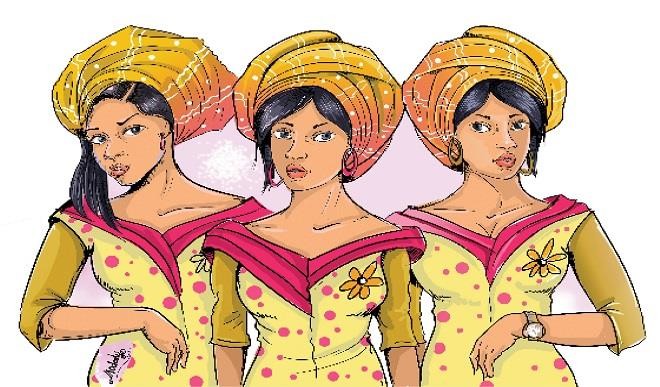Has Aso Ebi overstayed its welcome?
A Nigerian writer, Mabel Segun, in one of her articles on Aso ebi, talked about the culture shock that might greet a foreigner stepping in to Nigeria for the first time and encountering people garbed in clothing made from the same fabric, often times in bright colours at an event. In other climes, a woman […]


A Nigerian writer, Mabel Segun, in one of her articles on Aso ebi, talked about the culture shock that might greet a foreigner stepping in to Nigeria for the first time and encountering people garbed in clothing made from the same fabric, often times in bright colours at an event.
In other climes, a woman might feel awkward if at an event she meets another dressed similar to hers. But this is not be the case in Nigeria where at a function women strives for sameness in attire. In fact, it is those who are not dressed in similar clothing that might feel out of place because they will be seen as not “belonging” or not being able to afford the Aso ebi.
Aso ebi, a Yoruba phrase which literally means “Family Cloth”, is often chosen by a celebrant to her guests as the attire they will wear to the event. Men folks seem now to have caught-up with the Aso ebi fad. It is usually associated with women to the extent that Nollywood, the Nigerian movie industry had done several films portraying the extend women go to purchase such items which aside from the cloths can include gele, shoes, bags, jewelries, handkerchiefs.
A typical Nigeria wedding can have from two to 20 categories of Aso Ebi for the groom’s family, bride’s family, bridal train, bride’s friends, flower girls, bride’s colleagues, groom’s colleagues, groom and bride’s parents and their colleagues the extended family and so on.
Is this a fad worth continuing? LifeXtra spoke to people who expressed divergent opinions.
A radio journalist, Aderohunmu-Alli Folashade Temitope, said that it is a “wasteful life style” as she doesn’t see the benefits it adds to ones’ party.
Temitope believes that the purpose over time, has been for the sake of uniformity “but when we critically look at it, only a few can afford this luxury.” She added that it is just a wasteful habit that is uncalled for. “Let people share in your joy without having to place a burden on them.”
A young mother, Seriki Sinota Yetunde Aro, feels that the advantages of Aso ebi outweighs it disadvantages. She enumerated several reasons why the fad should continue among which she said it closes the social economic gap. She said: “It will unite everyone in the party, no one needs to know who is richer or not” as all garbed in the same fabric.
She added that it gives the event “a cool boisterous rhythm in addition Aso ebi makes locating destination easier, as you can easily ask people ‘I am going to the party tiwon wo iru aso yi’ [I am going to a party where people wore this type of clothing].
She also said it gives the wearers a certain psychological level of affinity. The downside, according to her, is that celebrants often extort guests by selling the clothing at exorbitant prices and also by “making it unnecessarily necessary.”
Nwakaego Chukwufumnaya Ordiah opined that culturally “it is a beautiful symbolism that expresses subtly the brother’s keeper nature of Nigeria and Africa at large.” She said “It adds to the boisterous nature of African ceremonies with its popping colour and how dramatic it turns out.”
Like Yetunde, Nwakaego laments the outrageous prices they are usually sold, but still feels that the fad should continue “because culture remains beautiful.”
Expressing a contrary view, A life style blogger, Esther Adeniyi said “It’s a fad I wish would fade away completely.”
She joked that “Let’s take this Aso ebi menace as serious as feminism” because according to her, people especially women are “harassed” and pressurised to purchase these clothes.
“Careless women have one more extra rubbish to waste the family finance on. No advantage. All disadvantages,” Esther laments.
